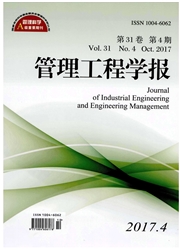

 中文摘要:
中文摘要:
针对一条联合开展大型装备研发的特殊供应链,本文分别在供应商仅具有过度自信、供应商同时具有过度自信和公平关切的情形下,通过对比分析与完全理性情况下的结果差异,来考察两者对供应链合作研发绩效的影响。研究发现:供应商较高的过度自信和公平关切有利于激励双边研发努力投入的同步提高,并且最终实现较高的产品质量水平。同时,可以设计一个合理的成果分享机制来优化供应链联合研发绩效。最后用数值仿真验证了供应商过度自信和公平关切对供应链联合研发绩效的影响。
 英文摘要:
英文摘要:
The equipment manufacturing industry suppliers are companies with highly specialized products and services, such as large generators, aircraft, satellites, locomotives, ships, large dedicated, and common equipment. Market drivers, technological advances, and globalization are leading to the increased interaction among parties in the supply chain of equipment manufacturing industry. Major challenges currently faced by manufacturing and high-tech industries include design complexity, globalization challenges and R&D cooperation. Hence, it is desirable to investigate (1) what factors will affect the performance of R&D cooperation in the equipment manufacturing industry supply chains, and (2) how to design a reasonable revenue sharing contract as the incentive mechanism to improve the performance of R&D cooperation. Overconfidence refers to a biased way of looking at a situation. When people are overconfident, they misjudge their value, opinion, beliefs or abilities. A sense of fairness concerns is a fimdamental human universal which means giving people "what they deserve". In addition, overconfidence and fairness concerns could affect individual's decision simultaneously. In this paper, we consider a two-echelon equipment manufacturing industry supply chain which is implemented by the dominated manufacturer and the supplier. The dominant manufacturer and the supplier engage in the game about R&D cooperation. We assume that the manufacturer is entirely rational, but the supplier will be divided into three kinds: entirely rational, overconfident, and overconfident and fair at the same time. This paper compares the results in different conditions to explore how a supplier's overconfidence and fairness concerns will affect the performance of R&D cooperation. Our study also generates a set of managerial insights that can be used to guide future empirical works. First, we find that overconfidence and fairness concerns will become the positive factors which can lead to the improvement of bila
 同期刊论文项目
同期刊论文项目
 同项目期刊论文
同项目期刊论文
 期刊信息
期刊信息
